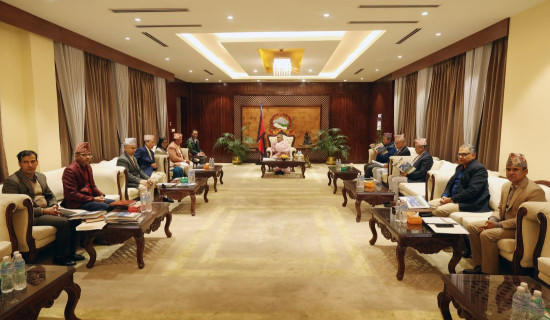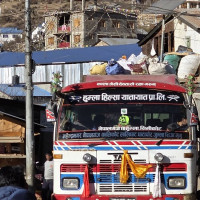- Friday, 9 January 2026
Discussions underway for constitution amendment
Lalitpur, Dec. 20: Speaker of the House of Representatives Devraj Ghimire has said that discussions are underway about the need for a review of the constitution.
"As the constitution nears a decade of implementation, discussions are underway about the need for its review. It is important to deliberate on our constitutional and legal provisions to keep the constitution dynamic and relevant to the times," he said at the National Governance Symposium (NGS) organised by Governance Lab of Daayitwa Abhiyaan in partnership with Nepal Administrative Staff College (NASC) with support from the Prime Minister's Office, National Planning Commission and Leadership Academy in Lalitpur on Thursday.
He stressed on greater cooperation among various levels of the government to ensure the success of federalism in Nepal especially in the areas like school education, civil service and police integration which are in the implementation phase.
"I believe that federal governance is a process of continuous improvement, addressing problems as they arise. However, the three levels of government still need to finalise some key policy and legal frameworks," said Speaker Ghimire.
Each level of government is carrying out its responsibilities, including policymaking and implementation, to achieve common goals like sustainable development. This includes addressing the needs of all sectors, genders, languages, religions, cultures, and minority communities while focusing on designing and implementing development and service delivery frameworks, he stated.
According to Ghimire, the success of federalism is also reflected in how well these aspects are addressed.
"There don’t appear to be major disagreements or disputes regarding the division of powers among the three levels of government and their implementation. Some of the shortcomings observed during the initial phase of federalism have also been resolved through practice," he said.
Ek Narayan Aryal, Chief Secretary of the Government of Nepal, said that lack of coordination among the sub-national governments in policy formation has posed challenges to the prosperity.
"Green resilience and inclusive development are the new initiatives in national development while participation of youth is paramount to this drive. This demands intensified collaboration among the three levels of the government," he said.
Aryal also suggested removing duplicities in laws and adopting participatory approach in formulating national and local policies. "The government is at the final stage to amend the laws that create obstacles in national development – including laws related to land acquisition and forest clearance," he said while seeking feedback from the conference in this initiative.
He stated that without proper digitalisation of public services, the delivery wouldn't be effective and productive, so the government has expedited the digital development in the areas like immigration, national identity cards and utility payments.
Speaking on the occasion, Sapana Malla Pradhan, a Supreme Court Justice, said that the constitutional bench at the Supreme Court has received many cases against the local body-enacted laws conflicting with the constitution of the country. "Strengthening of the local governments with better and effective policies and laws and capacity development of leaders is vital for good governance and effective service delivery," she said.
She also stressed that the intent of the laws should be good with their focus on facilitating people, not creating hurdles in their day-to-day affairs. Malla also said that there is a challenge in changing the opinion and attitude of people towards the inclusion of women across sectors and levels.
Likewise, Senior Vice-President of the Federation of Nepalese Chambers of Commerce and Industry, Anjan Shrestha, said that although the constitution had given a lot to all the communities the private sector still feels that it is a bit conservative in regard to the private sector.
The private sector had also fought to bring about new changes in politics and economy and was successful in mentioning 'open-market economy' in the constitution, he said. "Businesses and industries are still facing the challenge of tax duplication at various local bodies, all levels of the government should cooperate in removing such redundancies," he suggested.
Dr. Rajan Khanal, Executive Director of the NASC, said that since the country can't backtrack from the principles of inclusivity, it should learn from the federal and inclusivity models adopted by the federal states across the globe.
According to him, discourse among the governments should happen frequently to troubleshoot the challenges that arise while implementing the federal policies and practices.
The organisers said that the 2-day conference was organised to foster discussions on and create a collaborative community for governance innovations and inclusive development in Nepal.




-square-thumb.jpg)
-square-thumb.jpg)






-original-thumb.jpg)



